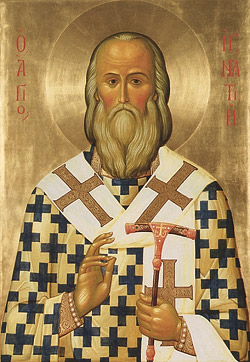Theology
Archpriest Andrei Tkachev: Climacus
29. March 2017 - 13:49 “Oh, if only I could / At least to some degree, / Write eight lines I would / About passion’s properties. / About the / transgressions and the sins, / The running and the chasing, / The hasty inadvertences, / The elbows, my palms”1—thus wrote Pasternak, aware that a precise, accurate word on the passions is difficult to give, and there can be few such words.
“Oh, if only I could / At least to some degree, / Write eight lines I would / About passion’s properties. / About the / transgressions and the sins, / The running and the chasing, / The hasty inadvertences, / The elbows, my palms”1—thus wrote Pasternak, aware that a precise, accurate word on the passions is difficult to give, and there can be few such words.
Precise words on the passions slip out of your hands, like a wet and lively fish, and the passions themselves are interwoven together, knit together one with another, forming a repugnant unity. Obviously the word “passions” in the this case is used as a synonym for “disease of the soul,” and not as romantic longing or a noble fire in the blood.
Saint Proclus: Sermon on the Annunciation
27. March 2017 - 9:05 Our present gathering in honor of the Most Holy Virgin inspires me, brethren, to offer her a word of praise, of benefit also for those who have come to this holy celebration. It is a praise of women, a glorification of their gender, which (glory) she brings to it, she who is both Mother and Virgin at the same time.
Our present gathering in honor of the Most Holy Virgin inspires me, brethren, to offer her a word of praise, of benefit also for those who have come to this holy celebration. It is a praise of women, a glorification of their gender, which (glory) she brings to it, she who is both Mother and Virgin at the same time.
O desired and wondrous gathering! O nature, celebrate that whereby honor is rendered to woman! Rejoice, O human race, that in which the Virgin is glorified. “But where sin abounded, grace did much more abound” [Romans 5:20]. The Holy Mother of God and Virgin Mary has gathered us here. She is the pure treasure of virginity, the intended paradise of the Second Adam, the place where the union of natures (divine and human) was accomplished, and the Counsel of salvific reconciliation was affirmed.
St. John of Damascus: On the Veneration of the Cross
21. March 2017 - 12:20 From An Exposition of the Orthodox Faith, Book IV, Chapter 11: Concerning the Cross and here further concerning Faith.
From An Exposition of the Orthodox Faith, Book IV, Chapter 11: Concerning the Cross and here further concerning Faith.
The word “Cross” is foolishness to those that perish, but to us who are saved it is the power of God (1 Corinthians 1:23). For he that is spiritual judges all things, but the natural man receives not the things of the Spirit. For it is foolishness to those who do not receive in faith and who do not consider God's goodness and omnipotence, but search out divine things with human and natural reasonings. For all the things that are of God are above nature and reason and conception. For should any one consider how and for what purpose God brought all things out of nothing and into being, and aim at arriving at that by natural reasonings, he fails to comprehend it. For knowledge of this kind belongs to spirits and demons.
Homily on the Third Sunday of Great Lent. On Carrying Your Cross
20. March 2017 - 11:39 Whosoever will come after me, let him deny himself, and take up his cross, and follow me (Mk. 8:34), said the Lord to his disciples, calling them unto Him, as we heard today in the Gospels.
Whosoever will come after me, let him deny himself, and take up his cross, and follow me (Mk. 8:34), said the Lord to his disciples, calling them unto Him, as we heard today in the Gospels.
Dear brothers and sisters! We too are disciples of our Lord Jesus Christ, because we are Christians. We too are called unto the Lord, to this holy temple, to hear His teaching. We stand before the face of the Lord. His gaze is directed at us. Our souls are laid bare before Him; our secret thoughts and hidden feelings are open to Him. He sees all of our intentions; He sees the truth, and the sins we have committed from our youth; He sees our whole life, past and future; even what we have not yet done is already written in His book.[1] He knows the hour of our passing into immeasurable eternity, and gives us His all-holy commandment for our salvation: Whosoever will come after me, let him deny himself, and take up his cross, and follow me.
St. Gregory Palamas and the Tradition of the Fathers
12. March 2017 - 18:25 "Following the Holy Fathers" ... It was usual in the Ancient Church to introduce doctrinal statements by phrases like this.
"Following the Holy Fathers" ... It was usual in the Ancient Church to introduce doctrinal statements by phrases like this.
The Decree of Chalcedon opens precisely with these very words. The Seventh Ecumenical Council introduces its decision concerning the Holy Icons in a more elaborate way: "Following the Divinely inspired teaching of the Holy Fathers and the Tradition of the Catholic Church." The didaskalia of the Fathers is the formal and normative term of reference.


